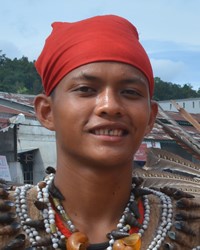The Malayic Dayak live in the province of West Kalimantan along the coast and in the islands of the Karimata Strait. The lush and mountainous island of Borneo is politically divided between the countries of Malaysia and Indonesia (and the tiny enclave of Brunei) and inhabited by two major groups of peoples, Muslim Malays and Christian and animistic Dayaks. The Malayic Dayak are sometimes called the Melayu Dayak (Dayak Malay), because they are a segment of the Dayak cluster of people groups that has converted to Islam. The Malay peoples of Southeast Asia live primarily in five countries: Malaysia, Indonesia, Brunei, Singapore and Thailand. The language of the Malayic Dayak is Malayic Dayak, consisting of the Tapitn, Banana', Kayung (Kayong), Delang, Semitau, Suhaid and Mentebah-Suruk dialects.
The Malayic Dayak are an agrarian people, subsisting primarily on the produce of their fields and gardens, as well fresh and salt water fish. Their cash crops include rice, coconut and rubber. Some also work as government employees and traders. The largest city in the Malayic Dayak area is Pontianak, the capitol of West Kalimantan Province. Pontianak was founded on a promontory where the Kapuas Besar (Large Kapuas), Kapuas Kecil (Small Kapuas) and Landak Rivers intersect. According to legend, this location was inhabited by the ghost of a woman who died in labor (pontianak), thus the name of the city. The city became the center of the Pontianak Malay kingdom, established under the rule of Sultan Syarif Abdurachman Alkadrie on October 23, 1771. Their kinship system is bilateral (tracing descent through both parents). Custom dictates that a new couple stays in the home of the wife until the birth of the first child, at which time the family then establishes their own home. Their residential areas are called kampung. Generally, their homes are raised on stilts two meters high to prevent the entrance of wild animals. Customary clothing for males is the traditional tunic (teluk belanga) with loose pants (slawar), worn with a woven silk cloth around the waist to below the knees, and a kopiah (Muslim hat). Women wear a long close-fitting blouse and a skirt of woven silk cloth decorated with gold embroidery.
The Malayic Dayak are loyal adherents to Islam. Their arts and culture have been greatly influenced by the culture of Islam. However, they also still believe in superstitions and animistic practices. The activities associated with almost every element in life (birth, marriage, burial, planting a field or building a new house) involve a syncretism of Islamic culture with animistic belief. Many dukun (shaman/healer/occultist) still remain influential in traditional medicing and often give advice concerning various matters, such as marriage planning, planting crops, or choosing a name.
The needs of the Malayic Dayak are compounded by their environment, which is difficult to reach and is therefore lagging behind other areas of Southeast Asia in education, industry and economic standards.
Pray for hundreds of Malayic Dayaks to be blessed with an unwavering faith in Christ, one that will not be shaken, no matter what comes their way.
Pray for God to bring about his purpose for the Malayic Dayak people.
Pray for Christians to have love, joy, peace, and patience as they tell others about the King of kings.
Pray for a mighty Holy Spirit revival to permeate their families and churches, drawing them into greater love for God and for their neighbors.
Scripture Prayers for the Dayak, Malayic in Indonesia.
PJRN - Indonesian National Research Network Copyrighted © Used with permission.
| Profile Source: Joshua Project |











